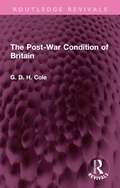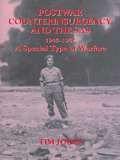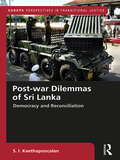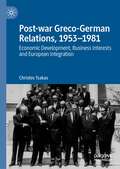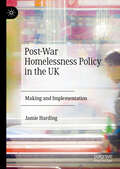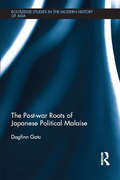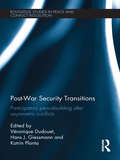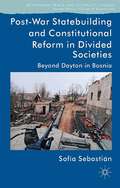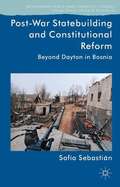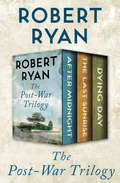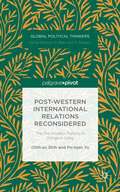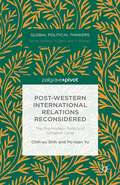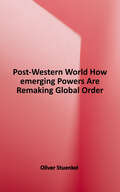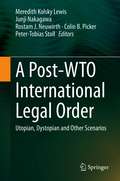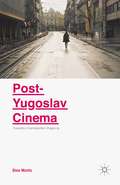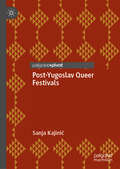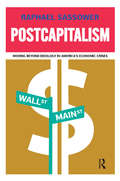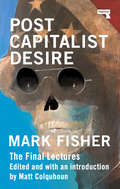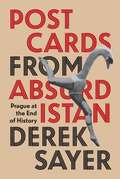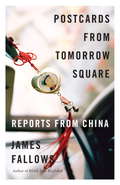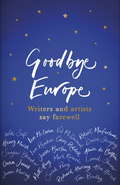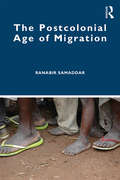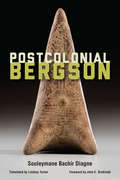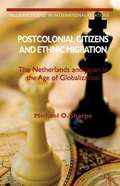- Table View
- List View
The Post-War Condition of Britain (Routledge Revivals)
by G.D.H. ColeFirst published in 1956, The Post-War Condition of Britain measures the extent of changes in Britain since the thirties. It contains more than two hundred tables on such matters as the national income, employment, production and productivity, investment and consumption; health, education, housing, and the insurance, assistance and similar services; on Trade Unions and industrial relations; class structure, political attitudes and party organizations; and the problems of local government and town and country planning. It is simply written, demanding from the reader the minimum of technical knowledge of economics or other specialized studies, and it should serve as an invaluable reference book for all who need exact information.
Post-war Counterinsurgency and the SAS, 1945-1952: A Special Type of Warfare (Military History and Policy)
by Tim JonesThis work details the state of British counterinsurgency knowledge by 1945, and shows how wartime special forces and unconventional warfare affected many postwar counterinsurgencies. The vital role of the Special Air Service (SAS) is revealed here for the first time.
Post-war Dilemmas of Sri Lanka: Democracy and Reconciliation (Europa Perspectives in Transitional Justice)
by S. I. KeethaponcalanBy investigating Sri Lanka as a case study, this book examines whether democracy, compared to authoritarianism, is conducive to post-war reconciliation. The research, founded on primary as well as secondary data, concludes that political systems have little to do with the success or failure of post-war ethnic reconciliation. The Sri Lankan case indicated that post-war reconciliation is more contingent on the readiness of the former enemies to come together. Readiness stems from, for example, satisfaction in the way issues have been resolved, confidence in the other party's intentions, and the compulsion to coexist. If the level of satisfaction, confidence, and the compulsion to coexist are low, the readiness to reconcile will also be low. The end of the war had a profound impact on post-war governance and ethnic relations in Sri Lanka. Hence, the volume provides an in-depth analysis of the factors that led to the military victory of the Sri Lankan government over the Liberation Tigers of Tamil Eelam (LTTE) in 2009. The chapters delve into the nexus between governance and reconciliation under the first two post-war governments. Reconciliation did not materialize in this period. Instead, new fault-lines emerged as attacks on the Muslim community escalated drastically. This book provides a comprehensive analysis of the nature of relations between the Sinhalese and Muslims and the Tamils and Muslims, as well as the nature and causes of post-war anti-Muslim riots.
Post-war Greco-German Relations, 1953–1981: Economic Development, Business Interests and European Integration
by Christos TsakasThis book explores the post-war Greco-German relationship and asks how this relationship fits into, and changes, the narrative of European integration. The book highlights West Germany’s role in shaping Greece’s development model and argues that Greece's accession to the Community in 1981 had a long back story in the modernization strategies adopted by the two countries as early as the 1950s. The success, not the failure, of those strategies lies at the root of Greece's lingering balance of payments problems: the ever-widening trade deficit with Germany, the country’s main trading partner, was the price of Greek economic growth in the decades following the war. By addressing this three-decade story of uneasy continuity, the book offers new insights into core-periphery relations in Europe, questions the conventional wisdom about Greece’s path to Europe, and challenges the way the so-called North-South divide has been adduced to explain the recent euro crisis. In doing so, the author calls attention to past cooperation between leading political and business circles in Greece and Germany, making this a useful and insightful read for historians and political scientists alike.
Post-War Homelessness Policy in the UK: Making and Implementation
by Jamie HardingThis book discusses homelessness policy in the UK from 1945 to 2019. It identifies five key factors that have driven policy: the favoured explanations for homelessness, distinctions between different groups of homeless people, demand for social rented housing, geographical differences and the forms of prevention preferred by policy makers. The account analyses how these factors have influenced key pieces of legislation such as the 1948 National Assistance Act, the 1977 Housing (Homeless Persons) Act and the 2002 Homelessness Act. It also identifies the key issues that policy has sought to address at different times, including children being taken into care because of their parents’ homelessness, rough sleeping, the use of bed and breakfast hotels as temporary accommodation, social exclusion and welfare reform. In addition to published sources and archival material, the book draws on the experiences of two former Ministers and other key figures in the development of homelessness policy.
The Post-war Roots of Japanese Political Malaise (Routledge Studies in the Modern History of Asia)
by Dagfinn GatuWritings on post-war Japanese politics have tended to take for granted the dominance of the Liberal Democratic Party (LDP) as inevitable, without questioning how this came about. This book analyses the nature of Japanese party politics over the first four decades following the Second World War, assessing how the chief contenders – the conservative LDP and the socialists JSP (Japan Socialist Party) – competed in terms of their strengths and weaknesses relative to the other. Throughout, it addresses the questions: How effectively were the parties’ strengths harnessed? How did they alter over time? To what extent was the winning formula challenged? Did the loser have access to strengths with a major potential, and, if so, why did these remain underdeveloped? It extends widely to include discussion of the political system, the social and economic environment in which parties operated, internal party matters, especially factions, personal support groups, special interest groups, and the role of government bureaucracy. It shows why the Liberal Democratic Party was dominant, why the Japan Socialist Party remained out of power, and how successive prime ministers conducted policymaking in ways which often resulted in the bureaucracy taking the lead. Overall, the book shows how precedents for the political system and for policymaking were set in this important period, precedents which continue, and which have contributed significantly to the present conservative stance on many key issues.
Post-War Security Transitions: Participatory Peacebuilding after Asymmetric Conflicts (Routledge Studies in Peace and Conflict Resolution)
by Véronique Dudouet Hans J. Giessmann Katrin PlantaThis book explores the conditions under which non-state armed groups (NSAGs) participate in post-war security and political governance. The text offers a comprehensive approach to post-war security transition processes based on five years of participatory research with local experts and representatives of former non-state armed groups. It analyses the successes and limits of peace negotiations, demobilisation, arms management, political or security sector integration, socio-economic reintegration and state reform from the direct point of view of conflict stakeholders who have been central participants in ongoing and past peacebuilding processes. Challenging common perceptions of ex-combatants as "spoilers" or "passive recipients of aid", the various contributors examine the post-war transitions of these individuals from state challengers to peacebuilding agents. The book concludes on a cross-country comparative analysis of the main research findings and the ways in which they may facilitate a participatory, inclusive and gender-sensitive peacebuilding strategy. Post-War Security Transitions will be of much interest to students of peacebuilding, security governance, war and conflict studies, political violence and IR in general.
Post-War Statebuilding and Constitutional Reform: Beyond Dayton in Bosnia (Rethinking Peace and Conflict Studies)
by Sofía Sebastián-AparicioSebastián explores the experience of statebuilding and constitution making after violent conflict, using the failed reform of Dayton in Bosnia and Herzegovina as a case study to reflect upon the fundamental questions of post-war statebuilding, reform and the role of local and external actors.
Post-War Statebuilding and Constitutional Reform in Divided Societies: Beyond Dayton in Bosnia (Rethinking Peace and Conflict Studies)
by Sofía Sebastián-AparicioPost-War Statebuilding and Constitutional Reform in Divided Societies.
The Post-War Trilogy: After Midnight, The Last Sunrise, and Dying Day (The Post-War Trilogy #2)
by Robert RyanThree post–World War II adventure novels inspired by real events—from an acclaimed British author who “skillfully blends fact with fiction” (Time Out London). After Midnight: Ryan’s novel, based on a true story, begins with a letter from Australian bomber pilot Bill Carr to his daughter on her first birthday in 1944. That same day, he takes off on a mission over the mountains of Northern Italy and is never heard from again. Twenty years later, Lindy Carr arrives in Italy to find out what happened to her father. Her guide is Jack Kirby, a daredevil motorcycle racer and pilot who flew Mosquito fighters in the war and spent time among the Italian partisans. What Jack and Lindy uncover in the Italian Alps will change both their lives forever. “Ryan’s mastery of 1940s detail and his ability to discover intriguing but unvisited byways of the war can be taken for granted; but the more recent storyline shows him equally adept at handling a 1960s setting.” —The Sunday Times The Last Sunrise: The real history of World War II’s most daring fighter squadron is the inspiration for this riveting novel of adventure and romance in the Far East. In 1941, Lee Crane was a Flying Tiger, one of dozens of American pilots recruited to join the Chinese Air Force in the fight against the Japanese. Wild in the air and on the ground, the Tigers broke hearts all over Burma, and Crane was no different—until he fell in love with a stunning Anglo-Indian widow. But in the chaos of war, Crane lost track of the woman of his dreams, and spent the next seven years convincing himself it wasn’t meant to be. Now a chance encounter with another long-lost beauty has him ready to plunge back into the past, praying he will come up with a different answer this time. “The flying scenes are brilliantly handled. Ryan’s research is impressive. . . . Bold and successful.” —The Sunday Times Dying Day: In this Cold War spy thriller based on actual case files, a woman is willing to do whatever it takes to bring her sister home. In the darkest days of World War II, Laura McGill and her sister, Diana, ventured behind enemy lines on behalf of Britain’s Special Operations Executive. Now it is 1948, four years since Diana disappeared inside occupied France, and Laura has reached a point of desperation that leads her to kidnap the head clerk of the SOE at gunpoint to learn the name of the spy who ran her sister’s last mission. That spy, James Hadley Webb, will take Laura to the divided city of Berlin, where he is waging a shadow war of influence and intrigue—and losing. Laura’s arrival may be just what Webb needs to stop his agents from dying. “Thrilling post war espionage action.” —Tatler
Post-Western International Relations Reconsidered: The Pre-Modern Politics of Gongsun Long (Global Political Thinkers)
by Chih-Yu Shih Po-Tsan YuPost-Western International Relations Reconsidered.
Post-Western International Relations Reconsidered: The Pre-Modern Politics of Gongsun Long (Global Political Thinkers)
by Chih-yu Shih Po-tsan YuThis study offers a critique of international relations from the perspective of a pre-modern Chinese thinker, Gongsun Long. It explores both the potential and the danger of the post-Western quest for geo-cultural distinction.
Post-Western World: How Emerging Powers are Remaking Global Order
by Oliver StuenkelWith the United States' superpower status rivalled by a rising China and emerging powers like India and Brazil playing a growing role in international affairs, the global balance of power is shifting. But what does this mean for the future of the international order? Will China dominate the 21st Century? Will the so-called BRICS prove to be a disruptive force in global affairs? Are we headed towards a world marked by frequent strife, or will the end of Western dominance make the world more peaceful? <p><p>In this provocative new book, Oliver Stuenkel argues that our understanding of global order and predictions about its future are limited because we seek to imagine the post-Western world from a parochial Western-centric perspective. Such a view is increasingly inadequate in a world where a billions of people regard Western rule as a temporary aberration, and the rise of Asia as a return to normalcy. In reality, China and other rising powers that elude the simplistic extremes of either confronting or joining existing order are quietly building a "parallel order" which complements today's international institutions and increases rising powers' autonomy. Combining accessibility with expert sensitivity to the complexities of the global shift of power, Stuenkel's vision of a post-Western world will be core reading for students and scholars of contemporary international affairs, as well as anyone interested in the future of global politics.
A Post-WTO International Legal Order: Utopian, Dystopian and Other Scenarios
by Meredith Kolsky Lewis Colin B. Picker Peter-Tobias Stoll Junji Nakagawa Rostam J. NeuwirthThis book provides readers with a unique opportunity to explore how the international economic legal order (IELO) may look in a post-WTO world. The substance of this book presupposes (whether correct or not) that the WTO either: (a) Stagnates into the foreseeable future (Doha withers, no new Rounds, at best minor amendments, little new jurisprudence, effective collapse of the DSB); or (b) Falls apart completely. While neither is desirable, the book underlines that it must be conceded that neither is inconceivable. The collapse of the Soviet Union tells us that anything is possible (in 1986 no one foresaw the end of the Cold War - clearly it was a much more significant event than would be the case for the demise of the WTO and the current international economic legal order (IELO)). Similarly, just a year or two before Brexit or the election of US President Donald Trump, no one foresaw those two eventualities. Consequently, a worst-case scenario for the future of the WTO cannot be ignored – rather, it must be explored, as has been done in this book. Indeed, despite most IEL academics’ commitment to multilateralism and specifically to a vibrant and dynamic WTO, academics in the field are now beginning to seriously discuss what a post-WTO world could look like (and it was the project behind this book that first launched those discussions). Accordingly, this examination of the post-WTO world will be of great value to practitioners, governmental and international officials and scholars in the IELO. This is particularly so in an era of increasingly rapid change, during which legal scholarship must also address the future if it wants to contribute creative solutions to the resolution and management of the many serious contemporary problems facing our field.
Post-Yugoslav Cinema: Towards a Cosmopolitan Imagining
by Dino MurticDrawing primarily on selected filmic texts from former-Yugoslavia, the book examines key social and political events that triggered the Yugoslav wars in the 1990s. Yugoslav politics and society are set within the broader artistic and cinematic strategies that helped stabilise post-Yugoslav territories strategies that were part of the national desire of looking forward to a time of 'perpetual peace' and its subsequent cosmopolitan norms. It argues that filmic texts demonstrate the degree to which nationalism was at the heart of the violent disintegration of Yugoslavia. Yet, the concern of the argument is not simply to offer a filmic critique but to develop an alternative to nationalism; namely, a theoretical framework through which cosmopolitan humanism is at the forefront of addressing former Yugoslavia's political wounds.
Post-Yugoslav Queer Festivals
by Sanja KajinićThis book explores two festivals over ten years: Queer Zagreb and Ljubljana Gay and Lesbian Film Festival. Kajinić focuses on the festivals’ participation in a regional network of queer festivals and provides an insight into how these festivals and their audiences negotiated the limits of non-normativity in particularly intensive ways between 2002-2012. By offering an interdisciplinary perspective and exploring the possibilities of critical visual methodology, the author relates the history of these important cultural projects and their organizational practices to the ways in which they impacted the lives of their participants.Post-Yugoslav Queer Festivals will be of interest to readers studying the region of Southeast Europe from a range of perspectives including gender studies, history, politics and festival studies.
Post-yugoslavia
by Dino Abazović Mitja VelikonjaThis interdisciplinary examination of present-day identities and histories of the former Yugoslavia explores relationships with the social, political, cultural and historical 'facts and fictions' that have marked the different parts of the region. It shows that while nationalism remains important other social dynamics also exert a strong influence.
Postcapitalism: Moving Beyond Ideology in America's Economic Crisis
by Raphael SassowerDebates over the role of government have intensified in the wake of America's deepest financial crisis since the Depression. This book suggests new ways of moving forward based on the policies and principles that have worked in the past. Sassower shows how American pragmatism has guided the more successful financial policies undertaken during the past century. This means that from the workplace to foreign aid, Americans benefit when they collaborate with each other rather than only pursue their self-interest in competitive ways. Drawing on thinkers from Adam Smith to Keynes to Bernanke, Sassower shows how a new era of postideological capitalism can emerge in the wake of the current economic crisis-renewing America's leadership for the future.
Postcapitalist Desire: The Final Lectures
by Mark FisherA collection of transcripts from Mark Fisher's final series of lectures at Goldsmiths, University of London, in late 2016.Edited with an introduction by Matt Colquhoun, this collection of lecture notes and transcriptions reveals acclaimed writer and blogger Mark Fisher in his element -- the classroom -- outlining a project that Fisher's death left so bittersweetly unfinished.Beginning with that most fundamental of questions -- "Do we really want what we say we want?" -- Fisher explores the relationship between desire and capitalism, and wonders what new forms of desire we might still excavate from the past, present, and future. From the emergence and failure of the counterculture in the 1970s to the continued development of his left-accelerationist line of thinking, this volume charts a tragically interrupted course for thinking about the raising of a new kind of consciousness, and the cultural and political implications of doing so.For Fisher, this process of consciousness raising was always, fundamentally, psychedelic -- just not in the way that we might think...
Postcards from Absurdistan: Prague at the End of History
by Derek SayerA sweeping history of a twentieth-century Prague torn between fascism, communism, and democracy—with lessons for a world again threatened by dictatorshipPostcards from Absurdistan is a cultural and political history of Prague from 1938, when the Nazis destroyed Czechoslovakia’s artistically vibrant liberal democracy, to 1989, when the country’s socialist regime collapsed after more than four decades of communist dictatorship. Derek Sayer shows that Prague’s twentieth century, far from being a story of inexorable progress toward some “end of history,” whether fascist, communist, or democratic, was a tragicomedy of recurring nightmares played out in a land Czech dissidents dubbed Absurdistan. Situated in the eye of the storms that shaped the modern world, Prague holds up an unsettling mirror to the absurdities and dangers of our own times.In a brilliant narrative, Sayer weaves a vivid montage of the lives of individual Praguers—poets and politicians, architects and athletes, journalists and filmmakers, artists, musicians, and comedians—caught up in the crosscurrents of the turbulent half century following the Nazi invasion. This is the territory of the ideologist, the collaborator, the informer, the apparatchik, the dissident, the outsider, the torturer, and the refugee—not to mention the innocent bystander who is always looking the other way and Václav Havel’s greengrocer whose knowing complicity allows the show to go on. Over and over, Prague exposes modernity’s dreamworlds of progress as confections of kitsch.In a time when democracy is once again under global assault, Postcards from Absurdistan is an unforgettable portrait of a city that illuminates the predicaments of the modern world.
Postcards from Tomorrow Square: Reports from China
by James Fallows“Americans need not be hostile toward China's rise, but they should be wary about its eventual effects. The United States is the only nation with the scale and power to try to set the terms of its interaction with China rather than just succumb. So starting now, Americans need to consider the economic, environmental, political, and social goals they care about defending as Chinese influence grows. ” —from “China Makes, the World Takes” Since December 2006,The Atlantic Magazine's James Fallows has been writing some of the most discerning accounts of the economic and political transformation occurring in China. The ten essays collected here cover a wide-range of topics: from visionary tycoons and TV-battling entrepreneurs, to environmental pollution and how China subsidizes our economy. Fallows expertly and lucidly explains the economic, political, social, and cultural forces at work turning China into a world superpower at breakneck speed. This eye-opening and cautionary account is essential reading for all concerned not only with China's but America's future role in the world. From the Trade Paperback edition.
Postcards to Europe: The unique must-have collection
by VariousThis is not a book about politics. It is a book about what makes us British, and what makes us European.Spend time with some of your favourite writers and artists in this truly unique collection spanning everything from art, language, food, music and movies, to war, literature, driving, nudity, geography, smoking and nature.Featuring pieces of exceptional quality from some of our most treasured novelists, historians, journalists, poets and artists, including: Jessie Burton, Richard Herring, Alain de Botton, Tom Bradby, Val McDermid, Matt Haig, Afua Hirsch, Lionel Shriver, Sarah Perry, Sanjeev Bhaskar, Ian Rankin, Owen Jones, Mark Kermode, Robert Macfarlane, Chris Riddell, Former Prime Minister Jim Hacker and many more.A must-read for anyone who wants to understand the times we live in, our relationship with the continent, and ourselves.* * * * *INCLUDES PIECES BY:Yasmin Alibhai-Brown, Sanjeev Bhaskar, Tom Bradby, Jessie Burton, Ben Collins (aka The Stig), Colonel Tim Collins, Robert Crampton, Adam Dant, Alain de Botton, Kate Eberlen, Matt Frei, Nicci French, Simon Garfield, Jonathan Lynn writing as Former Prime Minister Jim Hacker, Matt Haig, Richard Herring, Jennifer Higgie, Afua Hirsch, Owen Jones, Oliver Kamm, Alex Kapranos, Mark Kermode, Hari Kunzru, Olivia Laing, Marie Le Conte, Amy Liptrot, Robert Macfarlane, Henry Marsh, Val McDermid, Ian McEwan, Hollie McNish, Kate Mosse, Jenni Murray, Sarah Perry, Ian Rankin, Jacob Rees-Mogg, Cathy Rentzenbrink, Chris Riddell, Andrew Roberts, Will Self, David Shrigley, Lionel Shriver, Sunny Singh, Ece Temelkuran, Rob Temple, Bee Wilson, Sarah Winman
The Postcolonial Age of Migration
by Ranabir SamaddarThis book critically examines the question of migration that appears at the intersection of global neo-liberal transformation, postcolonial politics, and economy. It analyses the specific ways in which colonial relations are produced and reproduced in global migratory flows and their consequences for labour, human rights, and social justice. The postcolonial age of migration not only indicates a geopolitical and geo-economic division of the globe between countries of the North and those of the South marked by massive and mixed population flows from the latter to the former, but also the production of these relations within and among the countries of the North. The book discusses issues such as transborder flows among countries of the South; migratory movements of the internally displaced; growing statelessness leading to forced migration; border violence; refugees of partitions; customary and local practices of care and protection; population policies and migration management (both emigration and immigration); the protracted nature of displacement; labour flows and immigrant labour; and the relationships between globalisation, nationalism, citizenship, and migration in postcolonial regions. It also traces colonial and postcolonial histories of migration and justice to bear on the present understanding of local experiences of migration as well as global social transformations while highlighting the limits of the fundamental tenets of humanitarianism (protection, assistance, security, responsibility), which impact the political and economic rights of vast sections of moving populations. Topical and an important intervention in contemporary global migration and refugee studies, the book offers new sources, interpretations, and analyses in understanding postcolonial migration. It will be useful to scholars and researchers of migration studies, refugee studies, border studies, political studies, political sociology, international relations, human rights and law, human geography, international politics, and political economy. It will also interest policymakers, legal practitioners, nongovernmental organisations, and activists.
Postcolonial Bergson
by Souleymane Bachir DiagneHenri Bergson has been the subject of keen interest within French philosophy ever since being championed by Gilles Deleuze and others. Yet his influence extends well beyond European philosophy, especially within Africa and South Asia. Postcolonial Bergson traces the influence of Bergson’s thought through the work of two major figures in the postcolonial struggle, Muhammad Iqbal and Léopold Sédar Senghor. Poets and statesmen as well as philosophers, both of these thinkers—the one Muslim and the other Catholic—played an essential political and intellectual role in the independence of their respective countries. Both found, in Bergson’s work, important support for their philosophical, cultural, and political projects.For Iqbal, a founding father of independent Pakistan, Bergson’s conceptions of time and creative evolution resonated with the need for the “reconstruction of religious thought in Islam,” a religious thought newly able to incorporate innovation and change. For Senghor, Bergsonian ideas of perception, intuition, and élan vital—filtered in part through the work of the French philosopher Pierre Teilhard de Chardin—proved crucial for thinking about African art, as well as foundational for his formulations of African socialism and his visions of an unalienated African future.At a moment of renewed interest in Bergson’s philosophy, this book, by a major figure in both French and African philosophy, gives an expanded idea of the political ramifications of Bergson’s thought in a postcolonial context.
Postcolonial Citizens and Ethnic Migration
by Michael O. SharpeThis book provides a cross-regional investigation of the role of citizenship and ethnicity in migration, political incorporation, and political transnationalism in the age of globalization, exploring the political realities of Dutch Antilleans in the Netherlands and Latin American Nikkeijin in Japan.
